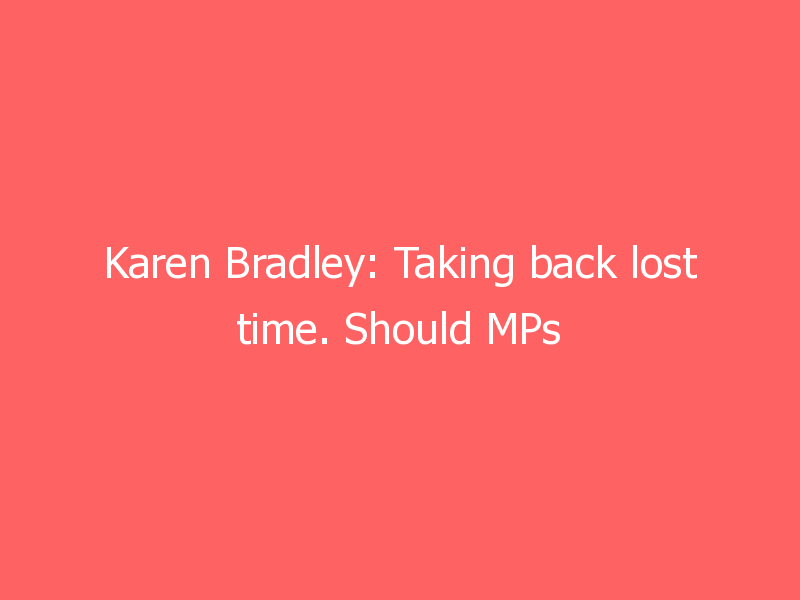Karen Bradley: Taking back lost time. Should MPs control the House of Commons agenda?

Karen Bradley is MP for Staffordshire Moorlands and Chair of the House of Commons Procedure Committee, which continues its inquiry into Commons’ Coronavirus procedures next week. Find out more here.
Earlier this week, experts at University College London’s Constitution Unit published a major new report on the House of Commons, titled Taking back control: why the House of Commons should govern its own time.
The interesting and detailed report calls for a raft of changes to transfer control of Commons time from ministers and the Government, to MPs and the House as a whole. The report proposes that this can be done by giving MPs the opportunity to vote each week on whether to approve, or if necessary, change Commons business.
Since 1902, the Standing Orders – the rules and regulations that determine how the House of Commons sits – have given precedence to Government business in the Commons. Few exceptions are permitted, such as Backbench Business or Opposition Day debates and Private Members’ Bills.
I view this change from my perspective not only as Chair of the Commons Procedure Committee, but also as a former whip, minister and secretary of state. It is certainly fair to say that control of the order paper – the formal schedule of business in the Commons – has been a matter of increased interest in recent years. From backbenchers “seizing the order paper” during proceedings on Brexit, to more recent events where the Government stacked the deck in a Commons vote on virtual participation. I have been vocal in my criticism of how the proceedings in the House have been handled by the Government at times throughout this pandemic, and this is an issue that some might argue could be well solved by rebalancing control of the order paper.
To my mind, the central question is whether the way the current system operates leaves too much power in the hands of the Government and is unfairly and unnecessarily restrictive – giving too much control to too few individuals.
It is easy to assume that parliamentary business is purely set by the Prime Minister, or cabinet ministers alone, but there is in fact a complex and intricate system of mechanisms by which parliamentary business is planned and negotiated. This process starts with a Cabinet Office committee called the Parliamentary Business and Legislation Committee, which provides the initial source of government proposals.
These proposals are then shaped and negotiated through the party whips – known as the usual channels – with a final schedule appearing in Business Questions every Thursday, presented by my friend and colleague the Leader of the House. It is usually in these statements from the Leader that you can see more open disagreements arise about the content of forthcoming business and diverging priorities between the parties.
There are many steps and reforms the House could take to rebalance power in determining control of the order paper. One suggestion from the Constitution Unit report is to present the Commons agenda as an amendable motion, another mechanism could be establishing a new Committee – a Commons Business Committee – to set the agenda (although the report stops short of calling for this directly). A more-light touch option could even simply be introducing more of a “House voice” so backbenchers can be better represented in negotiations through the usual channels.
The risk in not considering and planning for such reforms are clear. If the Government continues to maintain an ironclad grip on Commons business, it risks change being forced in an uncomfortable and scattergun approach, giving less than perfect results. The most important thing has always been ensuring that this House evolves and adapts by consensus.
The issue of controlling time in the House of Commons does not just apply to the schedule of various debates, but also the schedule of the entire calendar. Recent events from Brexit to the Coronavirus pandemic have led many to a conclusion that the Government’s powers in adjourning and recalling the House are too strong and need to be reviewed.
But is now the time to hold such a review? I’m not sure. While a review is arguably overdue, the procedures of the House of Commons have just gone through the biggest adaptations and innovations in more than 700 years.
Whatever the Procedure Committee investigates, it is essential that we continue to safeguard the procedures and processes of this House. There are still too many unanswered questions about the long-term impact of Coronavirus on our procedures to consider to embark immediately on such a profound and wide-ranging new inquiry.
For the moment, the Procedure Committee remains focused on a challenging and wide-ranging workload including an inquiry into our territorial constitution and our review of procedure under Covid restrictions. That doesn’t mean to say the Committee won’t consider such issues in the future – but timing, as ever, will be key.
Originally found on Conservative Home Read More








